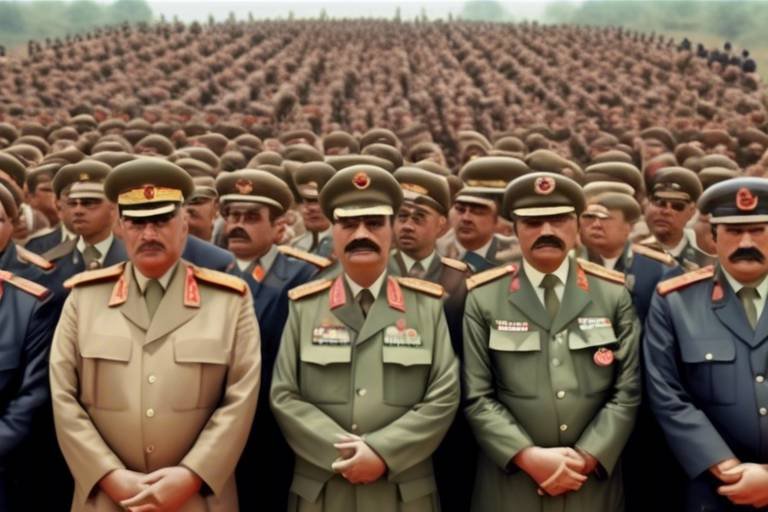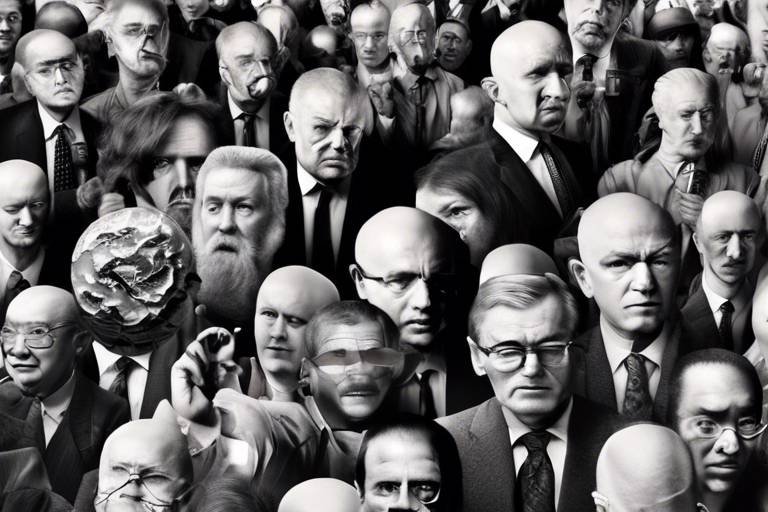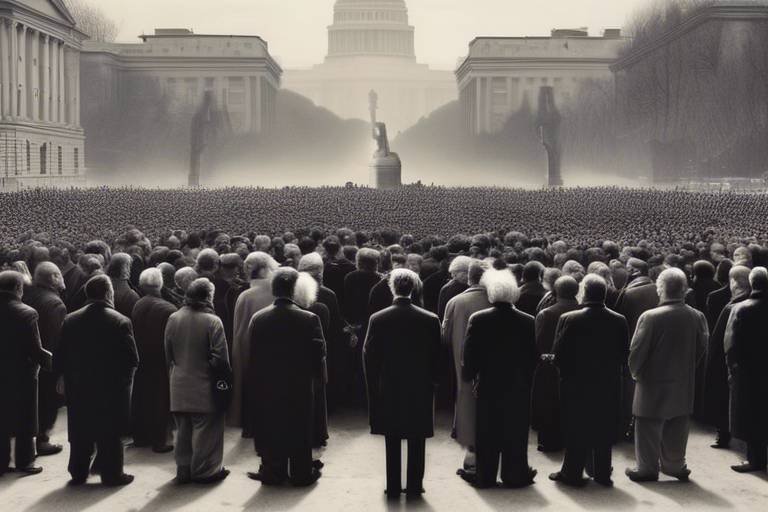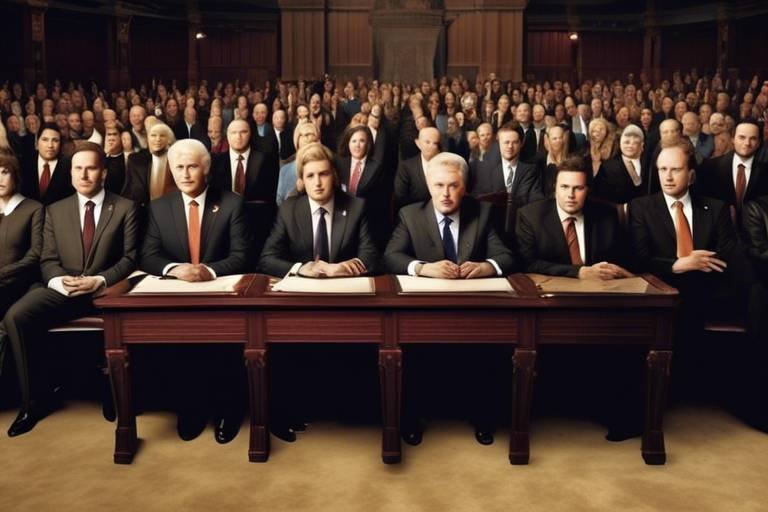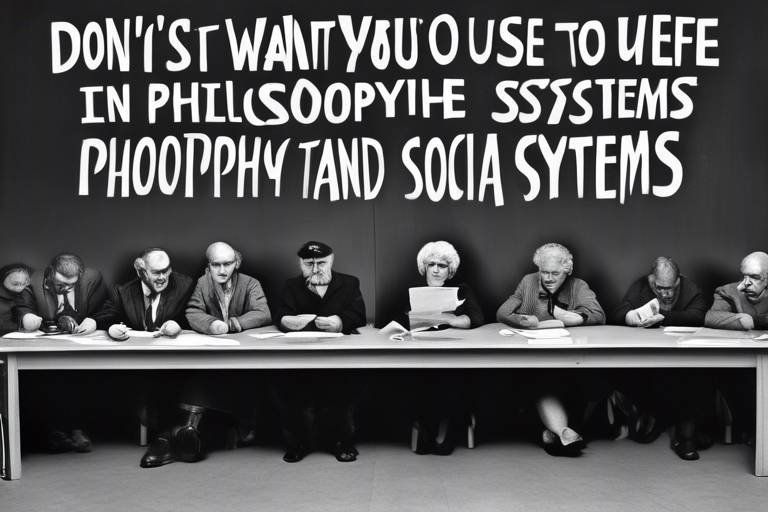Does Every Political System Have A Philosophy?
When we dive into the world of politics, it's hard to ignore the profound influence that philosophy has on various political systems. Imagine a grand tapestry, where each thread represents a different ideology, weaving together to form the fabric of governance. This intricate relationship between political systems and their underlying philosophies is not just fascinating; it's essential for understanding how societies operate. So, does every political system have a philosophy? The answer is a resounding yes! Every political structure, whether it's a democracy, authoritarian regime, or a socialist state, is grounded in a set of beliefs and values that guide its actions and policies.
At its core, political philosophy grapples with fundamental questions about justice, rights, and the role of the state in individuals' lives. It's like a compass, directing how we think about power, governance, and the responsibilities of citizens. For instance, consider how different philosophies approach the concept of freedom. In a liberal democracy, freedom is often viewed as the absence of interference, while in a socialist system, freedom might be understood in terms of economic equality and community welfare. This divergence highlights how philosophical underpinnings shape not only government structures but also societal norms and individual behaviors.
Furthermore, the historical evolution of political systems showcases how philosophical ideas have morphed over time. Take a moment to reflect on the ancient political philosophies that laid the groundwork for modern governance. Think of philosophers like Plato and Aristotle, whose ideas about ethics, justice, and citizenship continue to resonate today. Their thoughts have transcended time, influencing countless political systems across different cultures. Just as a tree grows from a seed, so too do political systems grow from the seeds of philosophical thought.
In exploring the question of whether every political system has a philosophy, we must also recognize the diversity of ideological frameworks that exist globally. For example, liberalism, conservatism, and socialism each present distinct philosophical perspectives that inform their political practices. Understanding these ideologies is crucial for analyzing their impact on governance and societal values. They act as lenses through which we can view the world, shaping our understanding of justice, rights, and the common good.
Ultimately, the interplay between political systems and philosophical ideologies is a dynamic and evolving relationship. As societies change, so too do their political philosophies, reflecting shifts in values, priorities, and challenges. This ongoing dialogue between philosophy and politics is what keeps our world vibrant and responsive to the needs of its people. So, the next time you find yourself pondering the nature of governance, remember that beneath every political system lies a rich tapestry of philosophical thought, waiting to be explored.
- What is political philosophy? Political philosophy is the study of fundamental questions about governance, justice, rights, and the role of the state.
- How do political philosophies influence governance? Political philosophies provide the foundational beliefs that shape laws, policies, and societal norms within a political system.
- Are there universal political philosophies? While there are common themes in political philosophy, different cultures and historical contexts give rise to unique political ideologies.
- Can political philosophies change over time? Yes, political philosophies can evolve as societies change and adapt to new challenges and ideas.

The Essence of Political Philosophy
Political philosophy is not just an academic discipline; it is the very lens through which we can understand the complexities of governance and society. At its core, political philosophy grapples with fundamental questions about justice, rights, and the role of the state in people's lives. Imagine you’re in a bustling marketplace, where every stall represents a different political ideology, each vying for attention. What makes one stall more appealing than another? The underlying philosophy that shapes its offerings! In this vibrant tapestry of thought, we find that political philosophy serves as a compass, guiding societies in their quest for a just and equitable existence.
One of the key aspects of political philosophy is its ability to frame the relationship between the individual and the state. Take, for instance, the question: "What rights do individuals possess, and how should the state protect these rights?" This inquiry leads us down a rabbit hole of ethical considerations and power dynamics. Political philosophers, from ancient times to modern thinkers, have sought to answer these questions, often leading to profound implications for governance structures. Their ideas have inspired revolutions, shaped constitutions, and even influenced the way we live our daily lives.
Moreover, political philosophy is not static; it evolves with the changing tides of society. The philosophical underpinnings of a political system can mirror the zeitgeist of its time. For example, during the Enlightenment, the rise of individualism and rational thought challenged the traditional authority of monarchies and paved the way for democratic ideals. This shift illustrates how political philosophy acts as a living dialogue between the past and the present, continuously shaping our understanding of governance.
To further illustrate the essence of political philosophy, consider the following table that outlines some of the major philosophical questions and their implications for political systems:
| Philosophical Question | Implication for Political Systems |
|---|---|
| What is justice? | Defines laws and policies that govern society. |
| What rights do individuals have? | Shapes the protection of civil liberties. |
| What is the role of the state? | Determines government structure and authority. |
| How should power be distributed? | Affects the political system's balance of power. |
In conclusion, the essence of political philosophy lies in its ability to address the core issues of human existence within the realm of governance. It is a reflection of our values, aspirations, and the social contract we forge with one another. Whether we realize it or not, the philosophies that underpin our political systems influence our everyday lives, shaping the world we navigate and the future we aspire to build. As we continue to engage with these philosophical questions, we not only deepen our understanding of political systems but also empower ourselves to actively participate in shaping the society we live in.
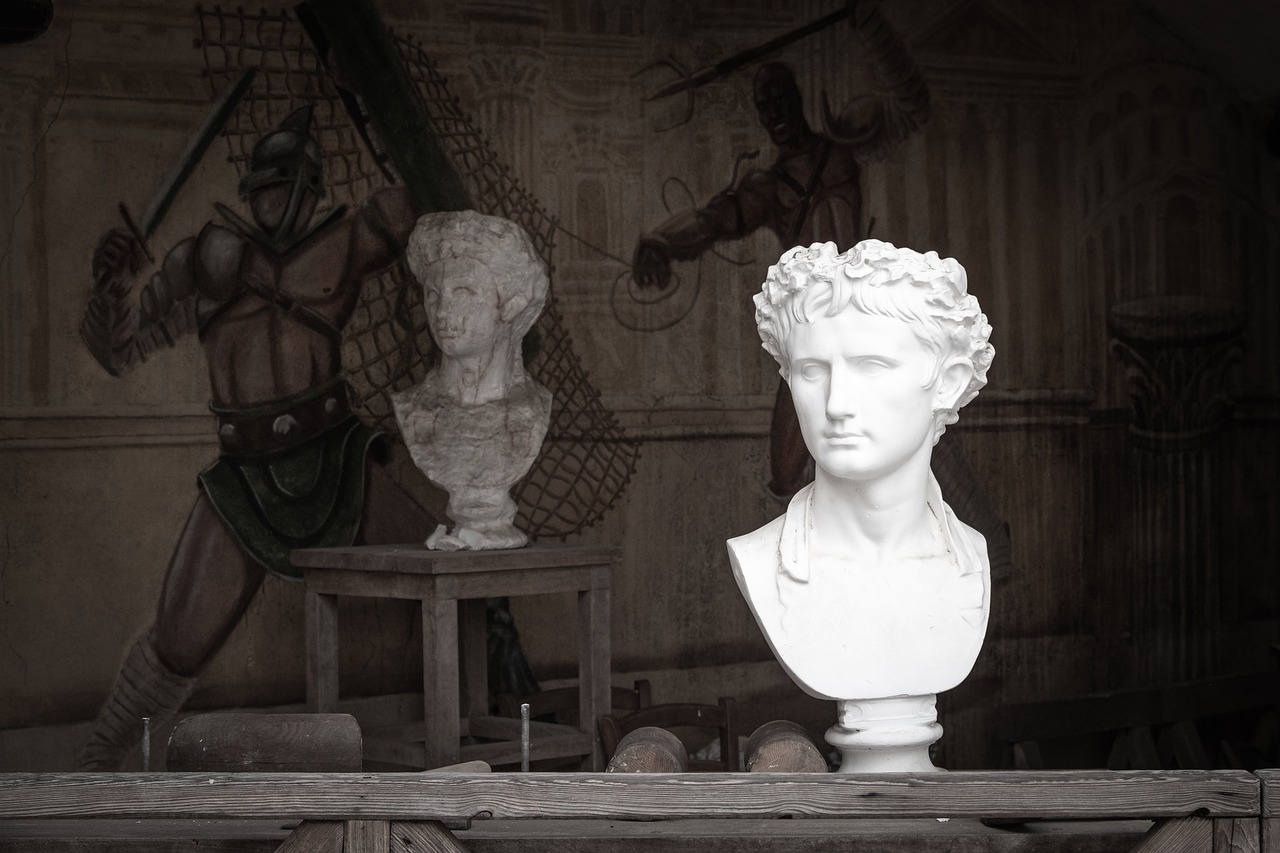
Historical Perspectives on Political Systems
The tapestry of political systems throughout history is rich and varied, woven from the threads of unique philosophical thoughts that have emerged in different cultures and epochs. These systems have not only shaped governance but also the very fabric of society itself. To truly grasp the evolution of political structures, we must delve into the historical contexts that birthed them. From the ancient city-states of Greece to the sprawling empires of Rome, each political system tells a story of its time, reflecting the prevailing ideologies and the philosophical underpinnings that guided them.
Consider the ancient Greeks, for instance. Their political philosophies were not merely theoretical constructs; they were deeply intertwined with the realities of their society. The city-state, or polis, was the center of political life, where citizens engaged in direct democracy. This system was profoundly influenced by the works of philosophers like Plato and Aristotle, who analyzed and critiqued the nature of governance. Plato's vision of an ideal state, governed by philosopher-kings, highlights how philosophical ideals can inform political structures. In contrast, Aristotle's emphasis on practical governance and the importance of virtue provided a more grounded approach, advocating for a government that serves the common good.
As we move forward in history, we see the emergence of the Roman Republic, which introduced concepts such as checks and balances and representative governance. The philosophical debates of the time revolved around the role of the individual versus the state, a theme that resonates even today. The decline of the Roman Empire led to a period of feudalism in Europe, where power was decentralized, and local lords held sway over vast territories. This shift in political structure was accompanied by a different set of philosophical inquiries, focusing on authority, divine right, and the social contract.
Fast forward to the Enlightenment, a period marked by a radical shift in political thought. Thinkers like John Locke, Jean-Jacques Rousseau, and Thomas Hobbes challenged the status quo, advocating for individual rights and the idea of government as a social contract between the rulers and the ruled. This era laid the groundwork for modern democratic systems, emphasizing the importance of liberty and equality. The philosophical debates of this time were not just academic; they sparked revolutions and redefined the relationship between citizens and their governments.
In examining these historical perspectives, we can see a clear evolution in political thought. Each system built upon the foundations laid by its predecessors, responding to the unique challenges of its time while also reflecting the philosophical ideas that were prevalent. The interplay between political systems and philosophies reveals a fascinating dynamic that continues to shape our world today.
- What is the significance of political philosophy in governance?
Political philosophy provides the foundational principles that guide the creation and functioning of political systems, influencing how justice, rights, and the role of the state are understood. - How did ancient political philosophies influence modern systems?
Ancient philosophers like Plato and Aristotle set the stage for contemporary political thought, introducing key concepts such as democracy, virtue, and the ideal state, which continue to resonate in today's governance. - What role did the Enlightenment play in shaping political ideologies?
The Enlightenment introduced ideas of individual rights and democracy, fundamentally challenging traditional systems and leading to the development of modern democratic governance.

Ancient Political Philosophies
The roots of political philosophy can be traced back to ancient civilizations, where thinkers began to ponder the nature of governance, ethics, and the role of individuals within society. These early political philosophies laid the groundwork for future political thought and continue to influence contemporary systems. Among the most notable philosophers of this era were Plato and Aristotle, whose ideas about justice, governance, and the ideal state have sparked debates for centuries.
Plato, in his seminal work, The Republic, envisioned a society governed by philosopher-kings—wise rulers who possess both the knowledge and virtue necessary to lead. He believed that a just society could only be achieved if those in power were philosophers, as they would prioritize the common good over personal interests. This idea raises a compelling question: can true justice exist without enlightened leadership? Plato's ideal state is a utopian vision that emphasizes the pursuit of knowledge and moral integrity, illustrating how philosophical ideals can shape political structures.
In contrast, Aristotle took a more practical approach to governance. His work, Politics, examines various political systems and their effectiveness, arguing that the best government is one that promotes the common good through a balanced mix of democracy, oligarchy, and monarchy. Unlike Plato, who sought an idealized version of governance, Aristotle believed in the importance of real-world application and the role of virtue in leadership. He famously stated that "man is by nature a political animal," highlighting the inherent social nature of humans and the necessity of political structures for achieving a flourishing society.
Both philosophers contributed significantly to the development of political thought, but their differing perspectives highlight a fundamental tension in political philosophy: the balance between idealism and realism. While Plato's vision inspires us to strive for a perfect society, Aristotle's practical insights remind us that governance must adapt to human nature and societal complexities. This dialogue between idealism and realism continues to shape political discourse today.
Ancient political philosophies not only shaped the course of Western thought but also influenced various cultures worldwide. For instance, the ideas of Confucius in China emphasized moral governance and the importance of virtuous leaders, paralleling Plato's thoughts on philosopher-kings. Similarly, the political structures of ancient Rome were heavily influenced by Greek philosophy, showcasing the interconnectedness of these early thinkers and their lasting impact on global governance.
To summarize, ancient political philosophies serve as a foundational pillar for understanding modern political systems. The insights of Plato and Aristotle, among others, invite us to reflect on the nature of justice, the role of leaders, and the responsibilities of citizens in shaping their societies. By examining these ancient ideas, we gain valuable perspectives on the ongoing evolution of political thought and its relevance in today's world.
- What role did Plato and Aristotle play in political philosophy?
- How do ancient political philosophies influence modern governance?
- What is the significance of the tension between idealism and realism in political thought?
Plato emphasized the importance of philosopher-kings and the pursuit of justice, while Aristotle focused on practical governance and the common good.
Ancient philosophies provide foundational ideas about justice, leadership, and societal responsibilities that continue to resonate in contemporary political systems.
This tension encourages a balanced approach to governance, recognizing the need for both visionary ideals and practical solutions to complex societal issues.

Plato's Ideal State
Plato's concept of the ideal state is not just a mere theoretical framework; it represents a vision that intertwines ethics, governance, and the pursuit of justice. In his seminal work, "The Republic," Plato articulates a society governed by philosopher-kings—wise rulers who possess both knowledge and virtue. This idea is revolutionary, suggesting that those who govern should be the most knowledgeable and morally upright individuals, contrasting sharply with the often chaotic nature of political leadership in his time. But what does this mean for us today? Imagine a world where leaders are chosen for their wisdom rather than their popularity or wealth. Wouldn't that be something?
Central to Plato's ideal state is the notion of justice, which he defines as each individual fulfilling their appropriate role within society. He categorizes society into three distinct classes: the rulers (philosopher-kings), the auxiliaries (warriors), and the producers (farmers, artisans, etc.). Each class has its own responsibilities and virtues, creating a harmonious society where everyone contributes to the common good. This hierarchical structure may seem rigid, but it emphasizes the importance of specialization and the idea that a well-ordered society functions best when everyone knows their place and performs their role effectively.
In Plato's view, the pursuit of the "Form of the Good" is paramount. He believed that the ideal state is not merely a political entity but a reflection of the ultimate truth and goodness. To achieve this, education plays a critical role. The rulers must undergo rigorous training in philosophy, mathematics, and dialectics to understand the deeper truths of existence and to govern justly. This educational journey is akin to climbing a steep mountain, where each step taken represents a deeper understanding of reality. Only those who reach the summit, the philosopher-kings, are fit to lead.
Moreover, Plato's ideal state is characterized by the absence of private property for the ruling class. He argues that personal wealth can corrupt the integrity of leaders, leading them to prioritize personal gain over the welfare of the state. Instead, philosopher-kings should live communally, sharing resources and focusing solely on the needs of their citizens. This radical idea raises questions about human nature and the balance between individual desires and collective responsibilities.
Despite its utopian elements, Plato's vision has sparked significant debate over the centuries. Critics argue that his ideal state is impractical and authoritarian, as it concentrates power in the hands of a few. Yet, the underlying principles of justice, the role of education, and the importance of virtuous leadership remain relevant in contemporary discussions about governance. As we navigate today's complex political landscape, we might ask ourselves: how can we integrate Plato's ideals into our systems without falling into the traps of elitism or authoritarianism?
In summary, Plato's ideal state serves as a compelling exploration of governance and ethics. It challenges us to think critically about who should lead and how leaders can be held accountable to the greater good. While it may not be a blueprint for a perfect society, it certainly provides a thought-provoking foundation for understanding the philosophical underpinnings of political systems.
- What is Plato's ideal state? Plato's ideal state is a philosophical concept where society is governed by philosopher-kings who possess knowledge and virtue, aiming for justice and the common good.
- How does Plato define justice? Plato defines justice as each individual fulfilling their appropriate role within society, contributing to a harmonious and well-ordered state.
- Why does Plato emphasize education for rulers? Education is vital for rulers to understand the deeper truths of existence and to govern justly, ensuring that they are equipped to make wise decisions.
- What are the classes in Plato's ideal state? The three classes are rulers (philosopher-kings), auxiliaries (warriors), and producers (farmers and artisans), each with their own responsibilities.
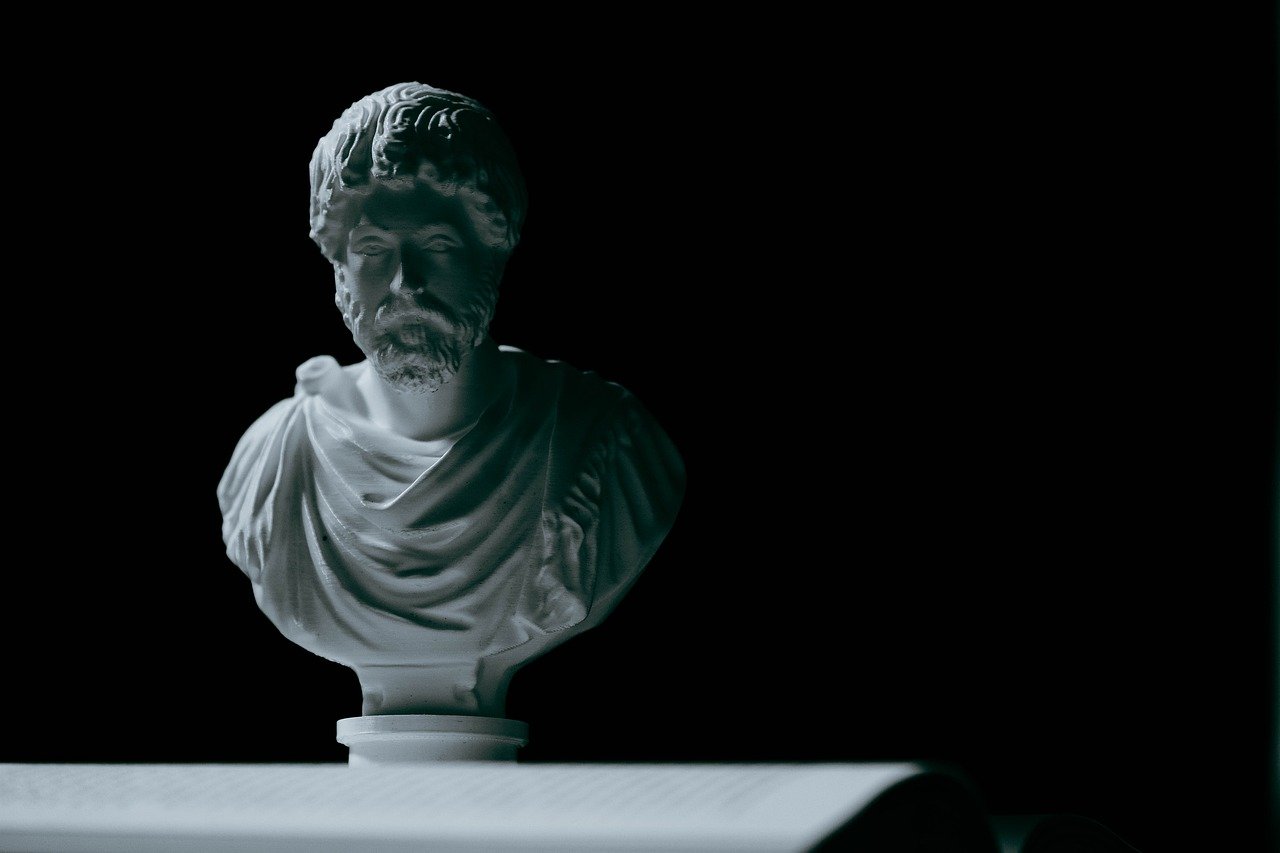
Aristotle's Practical Governance
Aristotle, often hailed as the father of political science, took a remarkably pragmatic approach to governance that stands in contrast to the lofty ideals of his predecessor, Plato. While Plato envisioned a utopia governed by philosopher-kings, Aristotle grounded his theories in the realities of human nature and the complexities of society. He believed that the purpose of the state is to promote the common good and ensure that citizens live virtuous lives. This perspective is not just theoretical; it is deeply rooted in the everyday experiences of individuals within a community.
One of Aristotle's key contributions to political thought is his classification of governments into three main types: monarchy, aristocracy, and polity. He argued that each of these forms could devolve into its corrupt counterpart: monarchy into tyranny, aristocracy into oligarchy, and polity into democracy, which he viewed as a potential path to mob rule. This cyclical view of governance illustrates Aristotle's understanding of the fragility of power and the necessity of checks and balances in any political system.
Aristotle's emphasis on virtue ethics is another cornerstone of his political philosophy. He believed that a good government must cultivate virtue among its citizens. This cultivation occurs through education and the establishment of laws that encourage moral behavior. In Aristotle's view, laws should not merely serve to punish wrongdoing but should actively promote a virtuous life. This idea resonates with contemporary discussions about the role of education in fostering civic responsibility and ethical leadership.
Moreover, Aristotle advocated for a mixed government system, combining elements of democracy, oligarchy, and monarchy to create a balanced political structure. He argued that such a system would mitigate the risks of corruption and tyranny, as it would incorporate diverse perspectives and interests. This idea of a mixed government can be seen in modern democratic systems, where checks and balances are designed to prevent any one branch of government from becoming too powerful.
In conclusion, Aristotle's practical governance is not just a relic of ancient philosophy; it offers timeless insights into the nature of power, the role of the state, and the importance of virtue in political life. His ideas encourage us to reflect on our own political systems and consider how they can be improved to better serve the common good. As we navigate the complexities of modern governance, Aristotle's teachings remind us that the pursuit of a just society is an ongoing journey that requires both critical thinking and active participation from all citizens.
- What is Aristotle's view on democracy? Aristotle believed democracy could lead to mob rule, but he also recognized its potential to reflect the will of the people when balanced with other forms of governance.
- How does Aristotle's philosophy apply to modern politics? His ideas about virtue, mixed government, and the common good continue to influence contemporary political thought and the design of democratic systems.
- What is the significance of virtue in Aristotle's political philosophy? Virtue is central to Aristotle's concept of governance, as he believed that a good state must promote ethical behavior among its citizens.

Modern Political Philosophies
Modern political philosophies emerged as a response to the challenges posed by traditional systems, particularly during the Enlightenment era. This period was characterized by a surge of intellectual thought that championed reason, science, and individual rights. Thinkers like John Locke, Jean-Jacques Rousseau, and Thomas Hobbes played pivotal roles in shaping ideas that would redefine governance and the relationship between the state and its citizens. Their philosophies not only questioned the divine right of kings but also laid the groundwork for modern democratic principles.
At the heart of modern political philosophies is the concept of the social contract. This idea suggests that individuals consent to form a society and establish a government to protect their rights and ensure social order. For instance, Locke argued that the government's legitimacy comes from the consent of the governed, a revolutionary thought that paved the way for democratic governance. This notion is still relevant today, as citizens continue to grapple with issues of representation and accountability in their political systems.
Furthermore, the emphasis on individual rights cannot be overstated. Modern political philosophies advocate for the protection of personal freedoms and liberties, challenging authoritarian regimes that suppress dissent. This is particularly evident in liberalism, which promotes the idea that individuals should have the freedom to pursue their own paths, as long as they do not infringe upon the rights of others. In contrast, philosophies like socialism argue for a more collective approach, emphasizing community welfare and economic equality as fundamental rights.
As we delve deeper into modern political thought, we encounter various ideologies that have emerged from these philosophical foundations. Each ideology offers a different perspective on governance and societal organization:
- Liberalism: Focuses on individual freedoms, free markets, and limited government intervention.
- Conservatism: Emphasizes tradition, social stability, and the importance of established institutions.
- Socialism: Advocates for social ownership and egalitarianism, addressing issues of class and economic justice.
- Feminism: Challenges gender inequalities and advocates for women's rights within political systems.
Each of these ideologies reflects a unique interpretation of the role of the state and the rights of individuals. For example, while liberalism prioritizes personal freedom, conservatism seeks to maintain social order through tradition. On the other hand, socialism pushes for systemic change to achieve economic equality, often critiquing the capitalist structures that dominate many societies today.
In conclusion, modern political philosophies are not merely academic exercises; they are living, breathing frameworks that shape our world. They challenge us to think critically about the systems in place and encourage us to envision a society that aligns with our values and aspirations. As we navigate the complexities of contemporary governance, understanding these philosophies becomes essential in fostering informed citizenship and advocating for a political landscape that reflects our collective ideals.
- What is political philosophy?
Political philosophy is the study of fundamental questions about the state, government, politics, liberty, justice, and the enforcement of a legal code by authority. - How do modern political philosophies differ from ancient ones?
Modern political philosophies emphasize individual rights and democracy, while ancient philosophies often focused on the role of the state and the importance of virtue. - What role does the social contract play in modern governance?
The social contract is a foundational concept that posits that governments derive their authority from the consent of the governed, influencing democratic practices worldwide.

Philosophy and Political Ideologies
Political ideologies are not just abstract concepts; they are the lifeblood of governance, deeply intertwined with philosophical principles that give them meaning and direction. To grasp the essence of any political system, one must understand the ideologies that fuel them. These ideologies—such as liberalism, conservatism, and socialism—are reflections of the philosophical debates that have shaped human thought throughout history. Each ideology presents a unique lens through which we can view the world, addressing fundamental questions about power, justice, and the role of the individual in society.
At the heart of liberalism lies the belief in individual freedoms and rights. This ideology champions the idea that every person should have the autonomy to make choices about their own life, advocating for a government that intervenes minimally in personal affairs. The philosophical roots of liberalism can be traced back to Enlightenment thinkers like John Locke, who argued that the protection of life, liberty, and property was essential for a just society. In modern democracies, liberalism has profoundly influenced policies that promote civil liberties, social justice, and equal opportunities for all. It raises the question: how much freedom should individuals have, and where do we draw the line for the greater good?
On the flip side, we have conservatism, which emphasizes tradition, social stability, and the importance of established institutions. Conservative philosophy often argues that change should be approached with caution, valuing the wisdom of past generations. This ideology is rooted in the belief that society functions best when it is anchored in time-tested values and norms. Conservatives might ask: what lessons can we learn from history, and how can we preserve the fabric of society amidst rapid change? This perspective is particularly relevant today, as many grapple with the pace of social transformation and its implications for community cohesion.
Then there's socialism, a political ideology that arose from a strong philosophical foundation focused on equality and communal ownership. Socialists argue that the capitalist system inherently leads to inequality and exploitation, advocating for a more equitable distribution of resources. The philosophical underpinnings of socialism challenge us to consider the impact of economic structures on societal well-being. For example, Karl Marx's critique of capitalism emphasizes the struggles between classes and calls for a system where the means of production are owned collectively. This raises pertinent questions: how can we ensure that everyone has access to basic needs? Is economic justice achievable in a capitalist world?
These ideologies are not merely academic; they manifest in real-world policies and political movements. Understanding the philosophical roots of each ideology helps us analyze their impact on political systems and societal values. For instance, in contemporary discussions about healthcare, education, and social welfare, the ideological battle between liberalism and socialism is evident. While liberals may advocate for market-based solutions, socialists push for universal access as a human right. This ongoing dialogue illustrates how political ideologies, grounded in philosophy, shape the very fabric of our societies.
In conclusion, the relationship between philosophy and political ideologies is profound and complex. Each ideology offers a different perspective on what constitutes a just society, influencing governance and public policy in significant ways. By examining these ideologies through a philosophical lens, we can better understand the motivations behind political actions and the societal structures that emerge from them.
- What is the main difference between liberalism and socialism? Liberalism focuses on individual freedoms and limited government, while socialism emphasizes equality and communal ownership.
- How do political ideologies influence governance? Political ideologies shape policies, laws, and the overall direction of government, affecting citizens' lives and societal values.
- Can political ideologies evolve over time? Yes, political ideologies often adapt to changing societal needs and historical contexts, leading to new interpretations and movements.

The Role of Liberalism
Liberalism is more than just a political ideology; it's a philosophical movement that emphasizes the importance of individual rights, freedoms, and the need for limited government intervention in the lives of citizens. Imagine a world where people have the autonomy to make choices about their own lives, free from oppressive structures that dictate their paths. This vision is at the heart of liberalism, which has shaped many democratic systems around the globe. By advocating for civil liberties and social justice, liberalism has played a crucial role in the evolution of modern governance.
At its core, liberalism is built upon several fundamental principles:
- Individual Freedom: The belief that each person has the right to pursue their own happiness and make personal choices without undue interference.
- Equality: The idea that all individuals should have equal rights and opportunities, regardless of their background.
- Rule of Law: The principle that laws should govern a nation, as opposed to arbitrary decisions by individual government officials.
- Democratic Governance: A commitment to representative government, ensuring that power is derived from the consent of the governed.
These principles not only form the backbone of liberal ideology but also influence policies that promote human rights, freedom of speech, and the right to assemble. In many countries, liberalism has led to significant social reforms, such as the abolition of discriminatory laws and the establishment of welfare systems aimed at providing a safety net for the less fortunate.
However, the role of liberalism is not without its challenges. Critics argue that an overemphasis on individualism can lead to social fragmentation and a lack of community responsibility. The balance between personal freedom and collective welfare is a delicate dance, one that liberal societies must continuously navigate. For instance, the debate surrounding issues like gun control and healthcare access often pits individual rights against the needs of society as a whole.
In recent years, the rise of populism and authoritarianism has put liberalism to the test. As people grapple with economic uncertainty and social change, there is a growing sentiment that challenges the liberal consensus. This has sparked a renewed interest in the role of government, with some advocating for a more interventionist approach to address inequality and social injustice. The dynamic nature of political ideologies means that liberalism must evolve to remain relevant in a rapidly changing world.
In conclusion, liberalism has played a pivotal role in shaping modern political systems, advocating for individual rights while promoting democratic governance. As society continues to evolve, the principles of liberalism will undoubtedly face new challenges, but their core tenets will remain essential in the quest for a just and equitable world.

Socialism's Philosophical Underpinnings
Socialism, at its core, is more than just an economic system; it represents a profound philosophical commitment to the ideals of equality and communal ownership. This ideology arose as a response to the inequalities perpetuated by capitalism, where wealth and resources are often concentrated in the hands of a few. The philosophical roots of socialism can be traced back to the works of thinkers like Karl Marx and Friedrich Engels, who argued that the capitalist mode of production inherently leads to class struggle. They believed that the exploitation of workers is a fundamental flaw in capitalist societies, prompting the need for a system that prioritizes the collective good over individual profit.
One of the central tenets of socialism is the concept of economic justice. This principle advocates for the redistribution of wealth to ensure that all individuals have access to basic needs such as healthcare, education, and housing. In a socialist framework, the state plays a crucial role in regulating the economy and ensuring that resources are allocated in a manner that benefits the entire society rather than a select few. This contrasts sharply with capitalist ideologies, which often promote free market principles that can lead to significant disparities in wealth and opportunity.
Moreover, socialism emphasizes the importance of solidarity among individuals. This idea is rooted in the belief that people are inherently social beings who thrive in communities. By fostering a sense of community and shared responsibility, socialism seeks to create a society where individuals support one another, thereby strengthening the social fabric. This focus on collective well-being can be seen in various socialist movements and policies worldwide, which aim to dismantle systems of oppression and create a more equitable society.
To further understand socialism's philosophical underpinnings, it's essential to recognize its critique of capitalism. Socialists argue that capitalism not only leads to economic inequality but also to social alienation, where individuals feel disconnected from one another and from their work. This alienation can result in a lack of fulfillment and purpose, as people are often reduced to mere cogs in a machine. By contrast, socialism seeks to empower individuals by providing them with a stake in the economy and a voice in decision-making processes. This empowerment is seen as vital for fostering a sense of belonging and purpose within society.
In summary, socialism is deeply intertwined with a philosophy that champions equality, community, and economic justice. Its critique of capitalism highlights the need for a system that prioritizes the collective good over individual gain, aiming to create a society where everyone can thrive. As we navigate the complexities of modern governance, understanding the philosophical foundations of socialism can provide valuable insights into the ongoing debates surrounding social and economic policy.
- What are the main principles of socialism? Socialism is based on principles of equality, communal ownership, and economic justice. It advocates for the redistribution of wealth and resources to ensure that all individuals have access to basic needs.
- How does socialism differ from capitalism? While capitalism promotes individual profit and free market principles, socialism prioritizes the collective good, aiming to reduce economic inequality and foster community solidarity.
- What role does the government play in socialism? In a socialist system, the government often plays a significant role in regulating the economy and ensuring equitable distribution of resources.
Frequently Asked Questions
- What is political philosophy?
Political philosophy is the study of fundamental questions regarding governance, justice, rights, and the role of the state in society. It serves as the backbone for understanding various political systems and their underlying ideologies.
- How do ancient political philosophies influence modern governance?
Ancient political philosophies, particularly those from thinkers like Plato and Aristotle, laid the groundwork for many modern concepts of governance, ethics, and citizenship. Their ideas continue to shape contemporary political thought and practices.
- What is the significance of liberalism in political thought?
Liberalism emphasizes individual freedoms and rights, advocating for limited government intervention. This philosophy has significantly influenced democratic systems and policies that promote civil liberties and social justice.
- How does socialism differ from capitalism?
Socialism focuses on equality and communal ownership, challenging capitalist frameworks that prioritize individual profit. Its philosophical foundations address class struggle and economic justice, impacting various political systems around the world.
- What role do political ideologies play in shaping societies?
Political ideologies, such as conservatism and socialism, are deeply rooted in philosophical principles. They help shape societal values, influence governance, and guide policy-making, ultimately affecting the lives of individuals within those societies.
- Can a political system exist without a philosophical foundation?
While it might be possible for a political system to operate without an explicit philosophical foundation, such systems often lack coherence and justification. Philosophy provides the necessary framework for understanding and legitimizing governance structures.
- Are there universal principles in political philosophy?
While many principles in political philosophy are widely recognized, such as justice and rights, their interpretations can vary significantly across cultures and historical contexts. This diversity reflects the complex nature of human societies and their governance.











